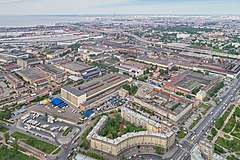Kirov Plant
The Kirov Plant, Kirov Factory or Leningrad Kirov Plant (LKZ) (Russian: Кировский Завод, tr. Kirovskiy Zavod) is a major Russian machine-building manufacturing plant in St. Petersburg, Russia. It was established in 1789, then moved to its present site in 1801 as a foundry for cannonballs. The Kirov Plant is sometimes confused with another Leningrad heavy weapons manufactory, Factory No. 185 (S.M. Kirov).
 | |
| Joint-stock company | |
| Industry | Mechanical engineering Defense industry |
| Founded | February 28, 1801 |
| Founder | Under the decree of emperor Paul I |
| Headquarters | , |
Area served | Coast Gulf of Finland |
Key people | General director George Semenenko |
| Products | Tractors, escalators, artillery etc |
| Revenue | $36.7 million[1] (2016) |
| $9.46 million[1] (2016) | |
| $6.57 million[1] (2016) | |
| Website | www |

History
In 1868 it was purchased by Nikolay Putilov and named the Putilov Company; it initially produced rolling stock for railways. It boomed during the industrialization of the 1890s, with the work force quadrupling in a decade, reaching 12,400 in 1900. The factory traditionally produced goods for the Russian government and railway products accounting for more than half of its total output. Starting in 1900 it also produced artillery, eventually becoming a major supplier of it to the Imperial Russian Army alongside the state arsenals. By 1917 it grew into a giant enterprise that was by far the largest in the city of St. Petersburg.
In February 1917 strikes at the factory contributed to setting in motion the chain of events which led to the February Revolution. After the October Revolution it was renamed Red Putilovite Plant (zavod Krasny Putilovets), famous for its manufacture of the first Soviet tractors, Fordzon-Putilovets, based on the Fordson tractor. The Putilov Plant was famous because of its revolutionary traditions. In the wake of Sergey Kirov's 1934 assassination, the plant was renamed Kirov Factory No. 100.
In World War II, the KV-1 tank was manufactured here. Starting around 2004 the Dartz T-98 Kombat luxury armored vehicle, somewhat reminiscent of the AM General Hummer, has been constructed at the Kirov site.
Kirov Plant delisted from the Moscow Exchange in 2011.[2]
References
- http://www.e-disclosure.ru/portal/FileLoad.ashx?Fileid=1306281.
- "Кировский завод ушел с биржи". Газета "Коммерсантъ С-Петербург". 10 July 2011. p. 16. Retrieved 26 August 2017.
- Peter Gatrell (1994), Government, Industry, and Rearmament in Russia, 1900-1914: The Last Argument of Tsarism, Cambridge University Press, ISBN 0-521-46619-9.
- Workers Unrest and the Bolshevik Response in 1919 written by Vladimir Brovkin in Slavic Review, Volume 49, Issue 3, (Autumn 1990) page 358-361
External links
- Official website


- St Petersburg Tractor Plant Subsidiary that builds tractors and agricultural machinery.
- Kirov Plant @ globalsecurity.org (plant's military production)